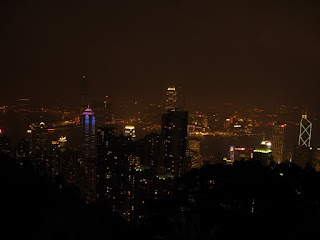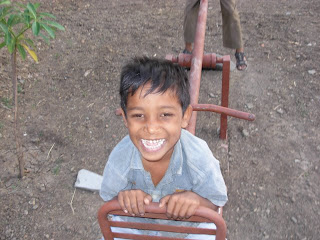One of the best things about traveling is that I have a lot of time to read. While the wireless internet here at the clinic is a distraction, I am still managing to get into some interesting books. While I've always been an avid reader, my professors and teachers have always dictated in what text my nose was to be buried, at least for 10 months of the year. Now, for the first time in my life, I have complete literary freedom. This new-found freedom is refreshing, but it can be overwhelming when I am confronted by thousands of books, all for only two or three dollars, but only a small backpack in which to put them. I’ve been told not to judge a book by its cover, but I’ve never been informed of a better way to discover new and interesting authors and titles in a heap (literally, there are piles upon piles of used books on the street) of books.
I've been putting together this list for the last few months to share some books that really deserve to be read, so here it is:
Top Ten Books I’ve Stumbled Across While Traveling
1. The Sane Society; Eric Fromm
Is it possible that this book was written almost fifty years ago? Fromme describes the current ills of our society with such timely precision that it is as if he is from the future rather than the past; his prose is a warning to us all about the consequences of the world's current socio-economic system. He is a psychologist by training, but his insights are primarily sociological in nature. In a sense he is looking at modern society as a disturbed psychiatric patient; not surprisingly the similarities are striking and the prognosis is grim. He is not a radical or a revolutionary, just an extremely intelligent and insightful observer of human nature at the individual and social levels. I have no idea why he is not recognized as one of his century's greatest social thinkers.
2. Train to Pakistan; Kushwant Singh
This is the first book I read after arriving in India – a short and simple parable by one of India's most famous writers. Kushwant Singh, a Sikh who is from the Punjab region of India and Pakistan, is a the author of dozens of books, both fiction and non-fiction, a former member of parliament, and an out-spoken critic of sectarian violence – a much needed renaissance man in India. Train to Pakistan tells the story of a small town torn apart during the 1947 partition of India and Pakistan. The book's power lies in its simplicity; it conveys a great deal about India's past and future almost effortlessly. If would liken it to India's “Of Mice and Men”. A quick, easy, and poignant read for those interested in one of the world’s greatest post-colonial tragedies.
3. Omnivore's Dilemma; Michael Pollan
Should be required reading for everyone who eats, purchases, or produces food. So, yeah, pretty much everyone. Pollan uses his skills as a journalist to look in-depth at the industrial food chain which monopolizes food production and distribution in the United States. Why did it take so long for a book like this to be written? After reading “Omnivore's Dilemma” you will never think about food the same way again; why should you? Why is it that we purchase food the same way we buy socks and laundry detergent – as cheaply as possible from big-box stores owned by massive corporations that have absolutely no vested interest in our health or the preservation of the environment? It is time we all take the food we eat more seriously for the sake of our health, the environment, and the economy.
4. An Ordinary Person's Guide to Empire; Arundhati Roy
She took the words right out of my mouth! Actually that is an exaggeration because I'm not gifted enough with language to have a mouth full of such expressive words and clever phrases. As the author of one of the best novels I've ever read (See #5: The God of Small Things) and this accessible, piercing critique of the American led trans-national economic empire, Arundhati Roy is officially my new hero. I don't know if she strives to be the next Noam Chomsky, but this collection of essays and speeches puts her at the forefront of a growing group of writers with the intellectual courage and historical perspective necessary to challenge corporate power's domination over human rights and national sovereignty. If you aren't angry after reading this book, you should either; A) read it again, B) travel to an impoverished part of the world to better understand the book’s perspective, or C) go back to your cubicle and work for the man.
5. The God of Small Things; Arundhati Roy
Storytelling at its best; enjoyable, thought-provoking, heartbreaking, and original. God of Small Things makes me want to go back to school and study literature because if there are more books out there like this, I want to read them. Of course it helps that I had just visited Kerala, which is the setting of the story and the author's state, but it is accessible to those who have no previous knowledge of the region. I think this might have been an Oprah book club pick, which is why I avoided it previously.
6. No Logo; Naomi Klein
Advertisements, logos, and brands permeate nearly every aspect of life in the developed world. According to Klein, we no longer purchase products, we buy brands. This idea is not revolutionary in itself, but Klein dives much deeper into this fundamental shift in consumerism and corporate behavior. This well-researched and comprehensive book succeeds in explaining how sweat-shop labor in the third world, sports stars who earn millions in endorsements, retail jobs that pay less than a living wage, and the decline of small businesses are all the result of the same process - branding. Branding has one overarching theme; the consolidation of economic power in the hands of a few very powerful corporations which are pathologically driven by the profit motive.
7. Karma Cola; Gita Mehta
This anthology of short stories contains some of the most colorful and creative writing I've ever come across, thanks in part to the liberal use of Indish, a unique blend of English and Indian languages. The theme of the book is the sometimes tragic, sometimes comical meeting of Eastern religious traditions with Western spiritual seekers. A fun and light book on a really fascinating inter-cultural phenomenon.
8. Outliers; Malcom Gladwell
Gladwell used his entertaining writing and clear, creative thinking to produce two other bestselling books, Blink and Tipping Point. This latest effort, Outliers, is about what makes a person or a place a statistical anomaly. He does an excellent job of weaving together disparate subjects with his thesis that most outliers are products of cultural and historical factors rather than individual geniuses or freaks of nature.
Here are a few examples that struck a chord with me. (Warning – if you want to read the book, skip this paragraph!) All professional hockey players are talented, but most of them also are born in the beginning of a year, making them more competitive against their slightly younger peers and therefore receive more practice time and praise. The astounding murder rate in certain areas of the American South was not due to a group of homicidal maniacs, but most likely the result of the cultural significance of honor in the Scottish region from which the population migrated. Finally, there is no doubt that Bill Gates is intelligent, but he is the richest an in the world because he attended a high school that had one of the first mainframe computers in the country – and had nearly 24/7 access to it! All of these examples prove that the people we perceive as god-like due to their success are actually just at the right place at the right time; products of historical forces that make their existing talents and skills extremely successful.
9. Hard Boiled Wonderland and the End of the World; Haruki Murakami
If you want to read some creative contemporary fiction, here it is. Originally written in Japanese, this is a very difficult book to describe, so I won't try, but if you like an innovative plot and entertaining writing, check out this book. Next on my reading list is another Murakami – Kafka on the Shore.
10; Shantaram; Gregory Roberts
An international blockbuster that every white person in India seems to be reading. As much as I hate reading what is on the display racks at airports and touristy shops, I finally broke down and read this one. Just the story about how the book was written is enough to hook any tentative reader; the author escapes from a high-security Australian prison, flees to India where he becomes both a slum doctor and mafia kingpin, only to be thrown back into prison where he writes “Shantaram”. Although parts of this story are verifiable, most people agree that the details in the book are more fiction than fact. Either way, it is a hell of a read. Roberts' writing is strong, the plot is intricately woven, and the characters are fascinating. My only complaint is that certain parts read more like an action adventure screenplay than a novel, but I can't deny that it is a hard book to put down.
. . . . . . .
I have some reservations about linking these titles to Amazon.com because it is such a powerful retailing giant, but it provides so many ways to investigate a book and its author that I like using it to discover new books on specific topics and themes. Once you use Amazon's sophisticated tools to point you to interesting books, you can always simply write down the title and buy it elsewhere. See, I did learn something from No Logo an An Ordinary Person's Guide to Empire!
More about Bhopal, maybe even some pictures of the big lakes and mosques, sometime next week.












